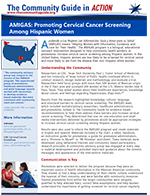AMIGAS: Promoting Cervical Cancer Screening among Hispanic Women and Latinas
Summary
 The AMIGAS program engaged community health workers, or promotoras, to deliver a multicomponent intervention that doubled the rate of cervical cancer screening among Mexican-American women in Texas and Washington. Community Preventive Services Task Force recommendations were used to inform the selection of program components which included one-on-one education and small media. (Released 2018)
The AMIGAS program engaged community health workers, or promotoras, to deliver a multicomponent intervention that doubled the rate of cervical cancer screening among Mexican-American women in Texas and Washington. Community Preventive Services Task Force recommendations were used to inform the selection of program components which included one-on-one education and small media. (Released 2018)
Lessons Learned
- Tailor materials and lessons to fit community needs. By developing bilingual materials that addressed concerns about cervical cancer screening raised by Hispanic women and Latinas, AMIGAS was able to break down barriers and increase screening rates.
- Engage community health workers to help open doors. In addition to sharing educational materials with clients, promotoras gave clients the time and tools to ask questions they might not have felt comfortable asking their healthcare providers.
- Use science for a strong foundation. Evidence-based recommendations from the CPSTF informed the selection of intervention approaches, and established behavioral theories were used to develop program materials.
- Form a community advisory group. Working closely with knowledgeable experts from the community was an important component of the intervention’s success.
Story
Understanding the Community
Researchers at CDC, Texas Tech University Paul L. Foster School of Medicine, and the University of Texas School of Public Health combined efforts to conduct formative research, design materials and methodology, and evaluate a trial.2,3 Researchers held focus groups with more than 500 women of Mexican origin in the El Paso area and surveyed 200 women at the U.S. Mexico border near El Paso, Texas. They asked women about their healthcare experiences, knowledge about cancer, and feelings regarding Papanicolaou (Pap) tests.
Results from the research highlighted knowledge, cultural, language, and structural barriers to cervical cancer screening. The AMIGAS team, which included multidisciplinary researchers, healthcare administrators, and promotoras, looked to The Community Guide for evidence-based recommendations to help them address these barriers and increase cervical cancer screening. They determined that one-on-one education and small media interventions delivered by promotoras would be appropriate strategies to increase cervical cancer screening among Hispanic women and Latinas.
Results were also used to inform the AMIGAS program and create materials in English and Spanish. Materials included a flip chart, a video, handouts, an instruction guide for promotoras, a guide for promotora administrators, and a “Promise to Myself” or “Mi Promesa” worksheet. These materials were developed using behavioral theories and community-based participatory research principles. A community advisory group was engaged at every step in material development and provided important guidance about the content, messages, and appearance of the intervention materials.
Communication Is Key
Promotoras were selected to deliver the program because they were an important source of health information in the Mexican-American community. They shared, or had a deep understanding of, their clients’ culture, understood the nuances of their concerns, and were familiar with community resources. Trained promotoras from within the target communities were uniquely qualified to help alleviate fears, correct false assumptions, and help women understand the importance of getting screened for cervical cancer regularly.
During one-on-one sessions, promotoras met with clients and shared bilingual program materials to explain the importance of cancer screening for early detection. Clients were encouraged to use a set of message cards to share their concerns with the promotoras, and ask questions without fear of being misunderstood or embarrassed. The AMIGAS team developed the cards based on survey and focus group results, which found some women had a mistrust of doctors or concerns about embarrassment or pain associated with Pap tests.
Achieving Success
A research trial was designed to evaluate the effectiveness of the AMIGAS program. In the trial, 613 women from border (El Paso, Texas), urban (Houston, Texas), and rural (Yakima, Washington) regions in the United States were randomly assigned to one of three study arms or a control group. The first study arm received the full AMIGAS program with a video and flip chart, the second arm did not watch the video, and the third arm did not see the flip chart. The control group did not receive any of the AMIGAS program materials.
Cervical cancer screening rates were significantly higher among women who participated in any arm of the AMIGAS trial when compared to women in the control group. Within the first six months, 52.3% of women in the first study arm had been screened for cervical cancer, compared with 45.5% in the second arm, 41.3% in the third arm, and 24.8% in the control group.3 These differences persisted when researchers examined the results by location.
Community health centers, health departments, and other agencies can use the to increase cervical cancer screening rates among Hispanic women and Latinas in their communities.
The AMIGAS program materials are available online free of charge.
1U.S. Cancer Statistics Working Group. U.S. Cancer Statistics Data Visualizations Tool, based on November 2017 submission data (1999-2015): U.S. Department of Health and Human Services, Centers for Disease Control and Prevention and National Cancer Institute; www.cdc.gov/cancer/dataviz, June 2018
2Smith JL, Wilson KM, Orians CE, Byrd TL. AMIGAS: building a cervical cancer screening intervention for public health practice. Journal of Women’s Health 2013;22(9):718-23.
3Byrd TL, Wilson KM, Smith JL, et al. AMIGAS: a multicity, multicomponent cervical cancer prevention trial among Mexican American women. Cancer 2013;119(7):1365-72.